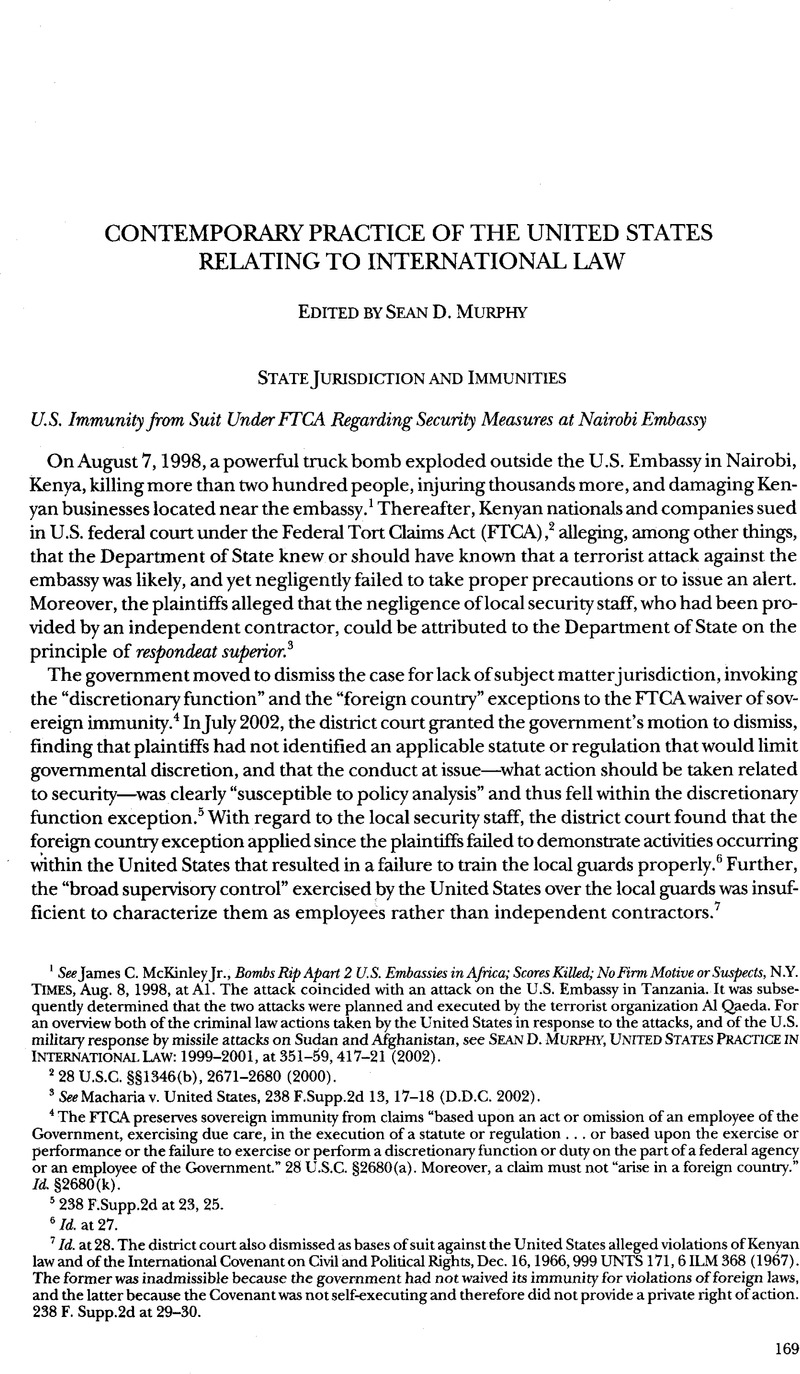No CrossRef data available.
Article contents
U. S. Immunity from Suit Under FTCA Regarding Security Measures at Nairobi Embassy
Published online by Cambridge University Press: 27 February 2017
Abstract

- Type
- Contemporary Practice of the United States Relating to International Law
- Information
- Copyright
- Copyright © American Society of International Law 2004
References
1 See James, C. McKinley Jr., Bombs Rip Apart 2 U.S. Embassies in Africa; Scores Killed; No Firm Motive or Suspects, N.Y. Times, Aug. 8, 1998, at A1.Google Scholar The attack coincided with an attack on the U.S. Embassy in Tanzania. It was subsequently determined that the two attacks were planned and executed by the terrorist organization Al Qaeda. For an overview both of the criminal law actions taken by the United States in response to the attacks, and of the U.S. military response by missile attacks on Sudan and Afghanistan, see Sean, D. Murphy, United States Practice in International Law: 1999-2001, at 351–59, 417–21 (2002).Google Scholar
2 28 U.S.C. §§1346(b), 2671-2680 (2000).
3 See Macharia v. United States, 238 F.Supp.2d 13, 17-18 (D.D.C. 2002).
4 The FTCA preserves sovereign immunity from claims “based upon an act or omission of an employee of the Government, exercising due care, in the execution of a statute or regulation . . . or based upon the exercise or performance or the failure to exercise or perform a discretionary function or duty on the part of a federal agency or an employee of the Government.” 28 U.S.C. §2680(a). Moreover, a claim must not “arise in a foreign country.” Id. §2680 (k).
5 238 F.Supp.2d at 23, 25.
6 Id. at 27.
7 Id. at 28. The district court also dismissed as bases of suit against the United States alleged violations of Kenyan law and of the International Covenant on Civil and Political Rights, Dec. 16, 1966, 999 UNTS 171, 6 ILM 368 (1967). The former was inadmissible because the government had not waived its immunity for violations of foreign laws, and the latter because the Covenant was not self-executing and therefore did not provide a private right of action. 238 F. Supp.2d at 29-30.
8 Brief for Appellee at 24-27, Macharia v. United States, 334 F.3d 61 (D.C. Cir. 2003) (No. 02-5252).
9 Id. at 32-33.
10 Id. at 35-38.
11 Id. at 43-45.
12 Macharia v. United States, 334 F.3d 61, 65 (D.C. Cir. 2003) (citation omitted). On January 20, 2004, the U.S. Supreme Court denied the request for a writ of certiorari in the case. See Macharia v. United States, 2004 WL 76694 (U.S.Jan. 20, 2004).
13 334 F.3d at 68-69.




